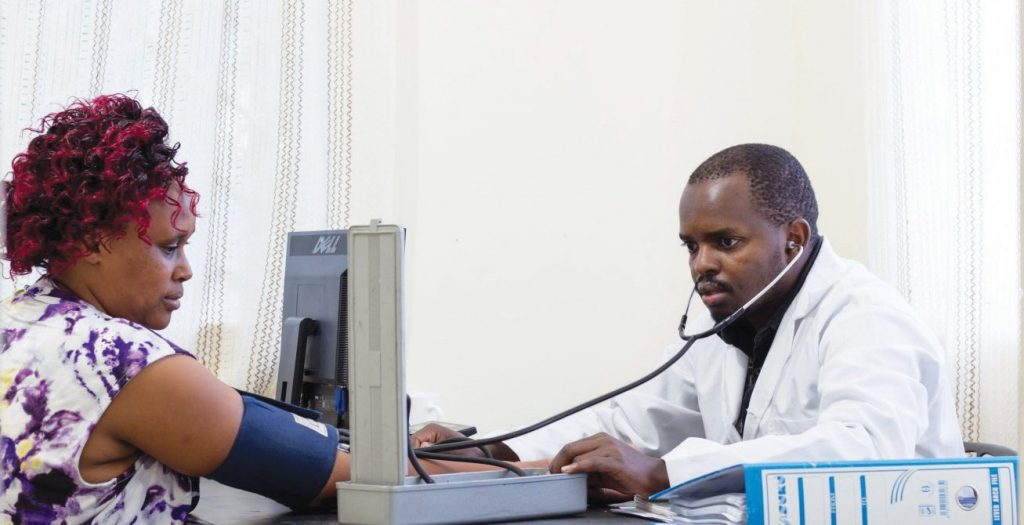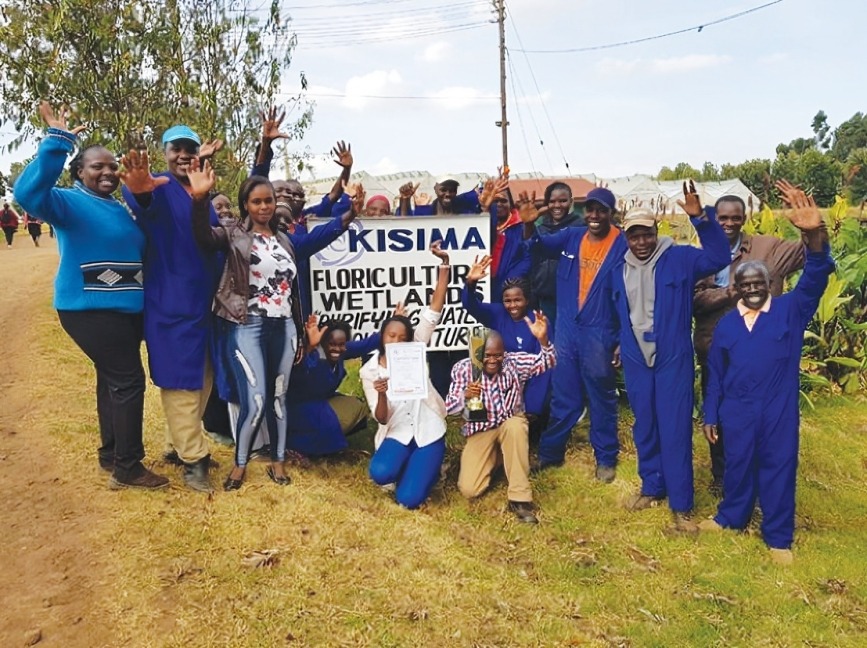October 9, 2025

Every morning, in greenhouses stretched across Kenya’s flower growing areas, millions of roses, carnations, and summer flowers are harvested by skilled hands. By the following day, many are auctioned in Amsterdam, arranged in London weddings, or displayed in Dubai hotels.
To the world, these flowers are commodities of beauty. But behind each stem lies a quieter story of farms building schools, running hospitals, digging boreholes, and creating social programmes that ripple across communities.
Corporate Social Responsibility (CSR) in Kenya’s flower industry is not an afterthought; it has become a defining characteristic of how the sector sustains itself and the communities around it. While approaches differ, the underlying truth is the same: farms are reshaping local realities well beyond their fences.
PJ Dave Flowers: Education and Health at the Core
“Education blooms alongside flowers.”
In Isinya and Timau, PJ Dave Flowers has anchored its CSR around education and health. The farm established Ole Lenku Primary and PJ Dave Primary, providing accessible schooling for hundreds of children from workers’ families and neighbouring villages. For rural households, where long treks to school can sap both time and income, these institutions represent opportunity made tangible.
Health is the second pillar. PJ Dave runs on-site clinics for workers and extends outreach services to nearby communities. In drought-prone Isinya, the company went a step further, constructing a large water trough to sustain Maasai herders’ livestock during dry seasons. Add in sponsorship of youth football teams, and the farm’s CSR demonstrates a layered approach: not just charity, but an investment in livelihoods and dignity.

Aquila Flowers: Partnerships for Water and Health
“When partnerships flow, so does clean water.”
Aquila Flowers, in collaboration with The AMRIT Foundation, has turned CSR into partnership. Together they supply clean water, run vaccination drives, and organize medical camps. An on-site clinic provides affordable care to both workers and surrounding communities, filling gaps left by overstretched public hospitals.
In a sector often criticized for water use, Aquila’s commitment to clean water supply shows how CSR can balance both perception and reality.
Subati Flowers: A School for 500
“For children of pastoralists, a classroom can be the first step to a different future.”
One of the standout education initiatives belongs to Subati Flowers. The school accommodates more than 500 children, many from pastoralist households. Beyond classrooms, the farm has invested in water systems, sports facilities, and scholarships.
By integrating both access and quality, Subati has ensured that children who might otherwise be left behind are part of a brighter future.
Fairtrade Premiums in Action: Flamingo, Karen, and Ravine Roses
“Workers decide, communities benefit.”
Flamingo Horticulture, one of Kenya’s largest producers, demonstrates how certification schemes can translate into community impact. Under Fairtrade rules, a 10% premium is added to every stem sold. Crucially, the funds are managed by worker committees, not management.
This democratic process channels money into bursaries, school feeding programmes, maternal health centers, or water projects, whatever workers deem most urgent.
Karen Roses and Ravine Roses in Baringo use the same Fairtrade system to empower communities. Whether it is bursaries for schoolchildren or water points in rural settlements, the model strengthens trust by ensuring workers’ voices shape outcomes.
Vegpro Group: Building CSR into Business
“Sustainability is not an add-on; it is the business model.”
Vegpro approaches CSR less through stand-alone projects and more by embedding sustainability in its operations. With farms in Naivasha and Timau, Vegpro has invested in waste reduction, energy production from organic residues, and efficient irrigation.
These initiatives may be less visible than a school building, but they illustrate how corporate responsibility can be woven into a business model, reducing environmental impact while saving costs and ensuring long-term viability.
Flora Ola and Red Lands Roses: Flexible, Needs-Based Care
“Empowering women empowers entire communities.”
Flora Ola in Naivasha has built classrooms and sanitation blocks, supported children’s homes, contributed to community policing, and donated flowers to hospitals. Plans to sponsor a football club underscore how CSR often adapts to local social needs.
Red Lands Roses in Ruiru
“Gender Equity in Tackling FGM and Domestic Violence.”
With 55% of staff being women, the farm provides daycare, school-fee subsidies, bicycles for commuting, and prenatal screening. A dedicated Gender Committee tackles cultural challenges like FGM and domestic violence.
Beyond its workforce, the farm supports clean-up campaigns, waste management education, and brightens hospital wards with Valentine’s flower donations.
Shalimar Fresh: A Comprehensive Model
“Few farms blend community and ecological care as seamlessly as Shalimar Fresh.”
Shalimar Fresh in Naivasha operates one of the broadest CSR portfolios in Kenyan floriculture. Fairtrade premiums have funded classrooms, bursaries, and creches, while a maternity wing at Naivasha Sub-County Hospital now serves thousands.
The farm also invests in infrastructure like ATMs, police posts, and daycare centres, while promoting staff training in health, waste management, and HIV/AIDS awareness. Environmental stewardship is equally prominent, with solar power, drip irrigation, and water recycling dams.
Kisima and TimaFlor: Anchors in Timau
“Securing social stability where they operate”
In Meru, Kisima Flower Farm supports nine schools through breakfast programmes and scholarships for vulnerable girls, directly targeting dropout rates. TimaFlor echoes this model, investing in hospitals, scholarships, and schools.
Here, CSR is less about corporate image and more about securing the social stability on which farm operations depend.

Other farms: Ploughing Back Millions of their Earnings.
All other farms in the country are also investing hugely in CSR and changing the communities they are located. Corporate Social Responsibility (CSR) in floriculture is not uniform, each farm approaches it differently depending on its location, workforce, and community needs.
NHFAIR: An Industry-Wide Effort
“An industry’s collective effort can outlast any single farm.”
Beyond individual farms, the Naivasha Horticultural Fair (NHFAIR) showcases CSR at an industry level. Proceeds from the annual event fund the NHFAIR Trust, which has supported schools, clinics, and other community projects across Naivasha.
The fair highlights that CSR is not just a corporate exercise but can be collective, pooling resources for broader impact.

What Makes CSR Work?
Looking across these examples, certain patterns define effective CSR in floriculture:
- Worker-led: Projects align with real needs and gain long-term support.
- Locally rooted: Designed for specific community realities.
- Linked to sustainability: Water, waste, and energy stewardship benefit both farm and society.
- Collaborative: Partnerships with NGOs, buyers, and government amplify impact.
- Evidence-based: Tracking results builds trust and credibility.
Challenges and the Next Frontier
“Consistency, not charity, builds trust.”
CSR is not without obstacles. Smaller farms face budget constraints during economic downturns. Climate change intensifies drought, threatening water projects. Rapid urban growth around growing areas strains public services beyond what farms alone can provide.
The future of CSR in floriculture may lie in systemic change: working with ministries to improve school performance, supporting basin-wide water governance, and linking clinics to county health systems.
Why CSR Will Define the Industry’s Future
“Each flower exported carries a story of community investment.”
For Kenya’s flower industry, CSR is no longer optional. Buyers request it, workers depend on it, and communities measure farms by it. Farms that integrate CSR into their DNA, making it part of water use, labour relations, and market positioning, will weather both climate and market shocks best.
Ultimately, CSR in floriculture is not about handouts. It is about building resilience, stability, and trust in regions where public resources are stretched thin. In many places, flower farms are stepping into roles once reserved for government, filling critical gaps in education, health, and livelihoods.
Each flower shipped abroad is thus more than a symbol of beauty. It carries within it the imprint of a farm investing not just in exports, but in the lives of the people and landscapes that make the industry possible.
